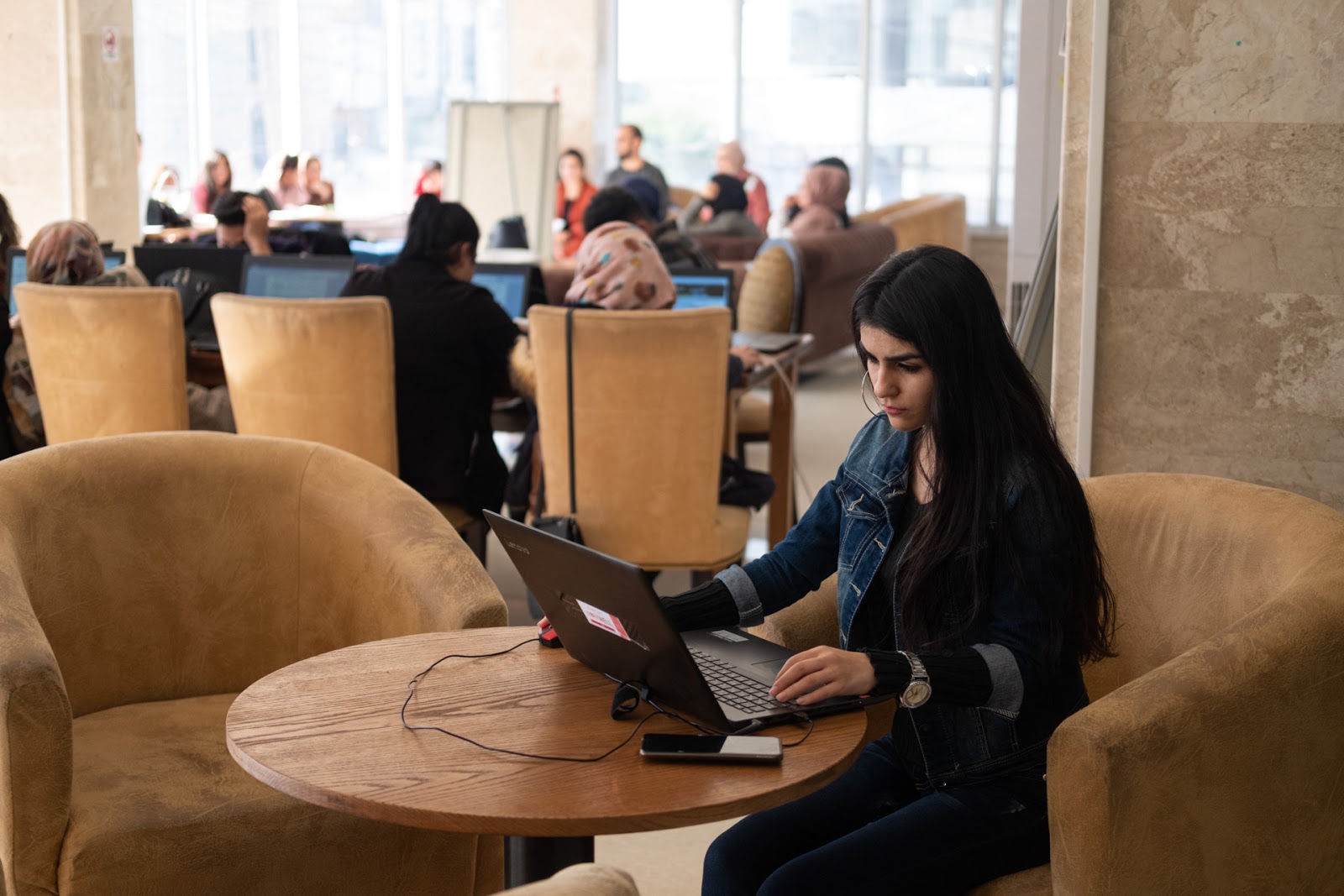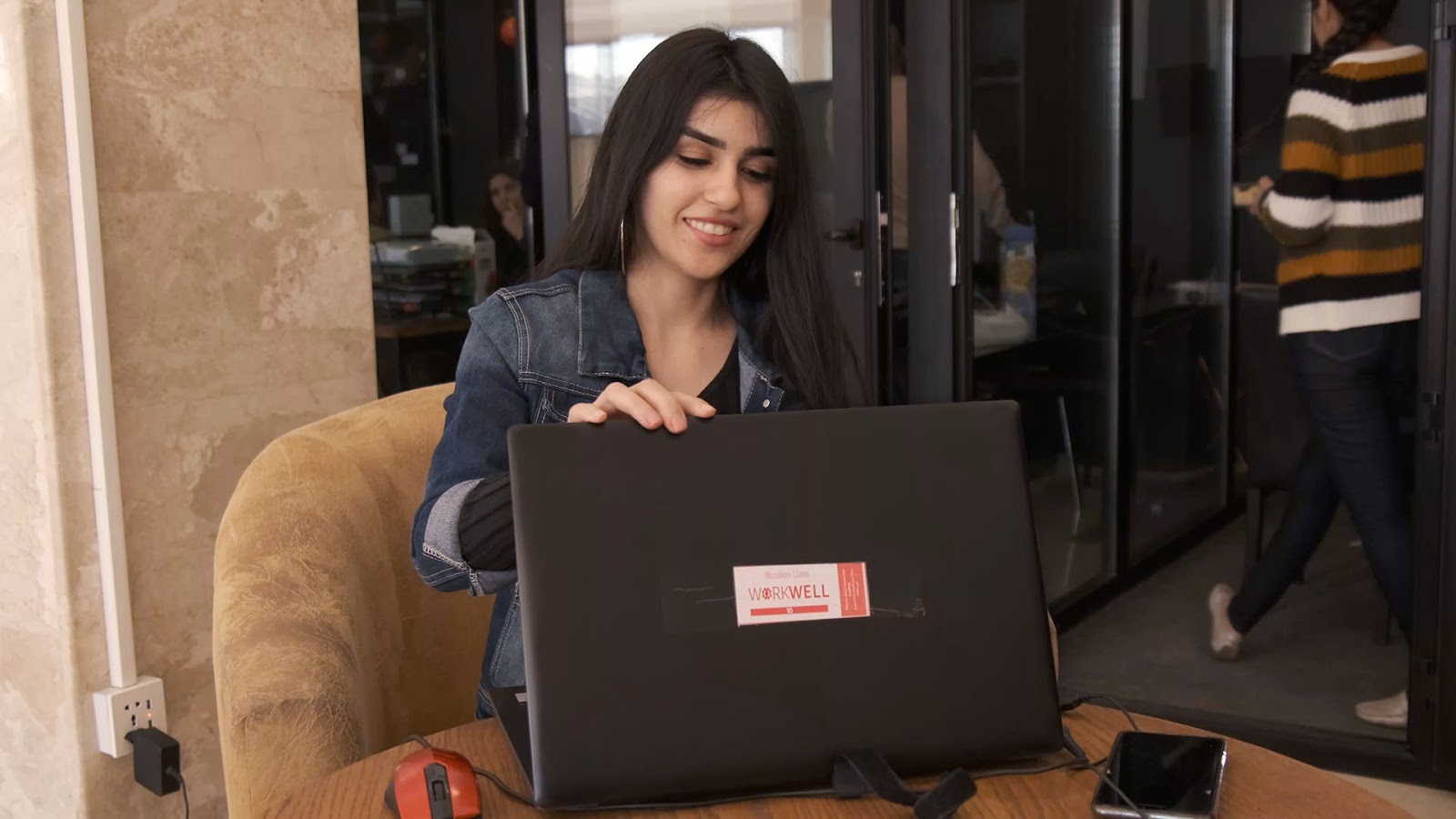Shewa is a freelance trainee at one of our tech hubs helping young Iraqis and Syrians find work on the digital marketplace.
Microwork is a burgeoning industry that helps young people like Shewa—particularly those in conflict-wrecked economies with sky-high unemployment rates—to get sorely needed jobs.
But unlike many of the workers that graduate from our tech hub, Shewa isn’t a refugee or an internally displaced person. She lives in her family home in Iraq, right here in the northern Kurdish city where one of our tech hubs is based.
But war has touched Shewa’s life, too. With Iraq’s economy and infrastructure still in ruins from decades of war, basic services like clean water, electricity, healthcare, and education are sorely lacking, fueling protests around the country that started earlier this year.
Shewar is 22 years old. In Iraq, unemployment for young people her age is a staggering 25%.
When that same age group makes up almost 60% of Iraq’s population, it has incredibly worrying implications for the country’s future. By keeping our tech hub open for Shewa and thousands of young Iraqis like her, you help them to earn the income they desperately need from non-traditional sources of employment.
Microwork
Shewa works for hours each day, performing a series of jobs on her computer or phone. She’s paid when she successfully completes each task to specification, whether it’s transcribing scanned documents or correctly labeling items in photos.
We’re training the first machine-learning workforce in Iraq. After extensive, hands-on training, our workers have the opportunity to be a part of microwork projects with clients around the world.
Related: How Microwork is the Solution to War
Microwork is online project-based work, where a series of tiny tasks (hence the name “microwork”) are completed by a virtual “assembly line” of individuals all over the world, on phones or laptops with an internet connection. The more tasks each worker successfully completes, the more he or she is paid.
Companies are using this huge global taskforce to provide the data required to train fledgling artificial intelligence (AI) systems to eventually complete the same tasks accurately.
Economic Opportunity
Experts from the World Bank estimate that if it keeps growing at its current rate, microwork will be a $2.5 billion industry by the year 2020. This represents an incredible opportunity for millions of Iraqis and other young people from war-torn countries who need desperately need jobs.
Around 20% of Iraqis still live below the poverty line, even though Iraq is one of the world’s largest oil-producing countries.

Poverty causes young people—men, especially—to turn to other means of employment, like becoming soldiers, in order to earn a wage and find purpose and self-worth. This was how ISIS drew so many to its cause—promising a place, community, and belonging to those who were rejected by the rest of the world.
Creating jobs gives people many more options to choose from than picking up a gun.
 Microwork, which requires basic reading, math, digital literacy skills, and an internet connection, is one way of creating jobs in large scale. Microwork is a practical, modern economic solution for getting thousands into the workforce, with minimal equipment and infrastructure. A laptop or mobile phone with an internet connection is often all the equipment a microworker needs to do his or her job.
Microwork, which requires basic reading, math, digital literacy skills, and an internet connection, is one way of creating jobs in large scale. Microwork is a practical, modern economic solution for getting thousands into the workforce, with minimal equipment and infrastructure. A laptop or mobile phone with an internet connection is often all the equipment a microworker needs to do his or her job.
Microwork projects can last a few short weeks to months. They require rigorous discipline and unwavering attention to detail.
Shewa has these in abundance, as well as an enormous drive to succeed. She still attends classes for four hours a day at our tech hub, and then spends another five or six hours working on a recent project that involves correctly identifying myriad medical items in a set of photos.

Shewa lost her dad some years ago, and her mother has struggled to provide for Shewa and her three brothers alone. One of Shewa’s younger brothers is currently working to help his family out, but a teenager has limited earning potential—certainly not enough to support a family of five.
So for Shewa, microwork is helping her to achieve a number of important things:
-
-
- She’s putting food on the table for her mother and three younger brothers, which her mother had struggled to do alone.
- She’s making sure her brothers can stay in school, and not have to drop out to look for work.
- She’s able to work in a field she has a deep passion for—technology.
Shewa is elevating her own future, and creating a future for her family in the process.
This is what you’re doing for our Iraqi brothers and sisters. At our tech hub, workers are trained in the skills that they need: basic computer literacy and English—the main language of the digital world—as well as specialized applications like web development, online bookkeeping, and image editing.
-
- And then they are also given a helping hand in finding jobs, whether these are freelance gigs, business opportunities, or microwork projects with international clients.Most of all, you’re enabling Shewa and her fellow Iraqis to dream vividly of a better life, of previously unreachable opportunities that are now within their reach.When you invest in young people like Shewa, you not only help them climb out of poverty and strife. You help them rebuild their homes, their communities, and reshape their country’s future.
Invest in the future of young Iraqis. Give now.
Further reading on Microwork:


